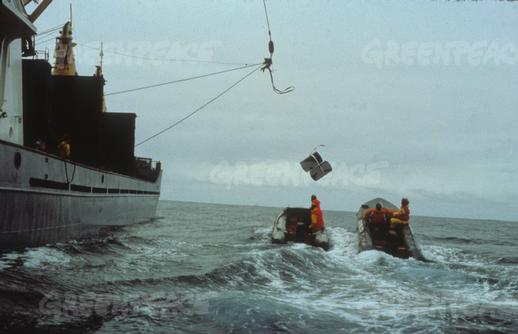Yesterday, I blogged about illegal dumping of nuclear waste in the Arctic Sea by the Soviet Union and Russia. The Soviet Union and Russia also dumped nuclear waste in the Sea of Japan.
In 1993, after the fall of the Soviet Union, Greenpeace announced that they had received reports that a Russia freighter was on its way to the Sea of Japan to dump nine hundred tons of nuclear waste. Greenpeace filmed the dumping operation and Japanese television broadcast it repeatedly. Japan lodged a complaint with the Russian government with respect to the dumping which was thought to be illegal under international law. It was confirmed later that such Russian dumping had been going on since at least 1959.
The London Convention of 1972 outlawed dumping of nuclear waste in the world's oceans. The Russians claimed that under the treaty they were allowed to dump "low-level nuclear waste." The Russian government said that it had given the Russia Navy permission to dump seventeen hundred tons of radioactive waste into the Sea of Japan in October and November of 1993. Other nations disagreed with the Russia interpretation of the treaty.
The Japanese government had agreed to a one billion and eight hundred million dollar aid package for Russia earlier in 1993. One hundred million of that aid package was intended to help Russia dismantle nuclear weapons. The Russian President arrived in Japan about a week before Greenpeace publicized the Russian nuclear waste dumping to sign an agreement with regard to nuclear waste dumping in the Sea of Japan. The agreement called for joint monitoring of the level of radioactivity in the Sea of Japan.
The Japanese public, government agencies, and various Japanese organizations including unions of fishermen demanded an immediate halt to the Russian dumping of nuclear waste into the Sea of Japan. Critical letters flooded the Russian Consulates in Japan and telegrams were sent directly to the Russian President. In late October of 1993, Russia announced that it would suspend the dumping of nuclear wastes into the Sea of Japan. However, Russia said that it might be forced to resume such dumping if it was unable to build a new waste processing plant within the next eighteen months.
Japan had opposed the prohibition of low level radioactive waste dumping in the world's oceans during the 1980s. Apparently they thought that they might want to dispose of their own waste in that way. After the Russia dumping was publicized in late 1993, signatories of the original London Convention met to discuss policy toward nuclear waste dumping. The outcome was an explicit and detailed ban on the dumping of any nuclear wastes into the ocean.
Nuclear waste continues to be dumped into the world's oceans by unscrupulous nuclear companies and organized crime syndicates such as the Mafia. In disregard of the London Convention, even government agencies in nuclear nations have continued to dump nuclear wastes into the ocean and seas of the planet or they have looked the other way while other organizations did the dumping. The world has been very concerned about the radioactive materials leaking from Fukushima into the Pacific Ocean. Unfortunately, Fukushima is not the first incident of radioactive materials being discharged into the world's oceans. Illegal ocean nuclear waste dumping has been going on for decades and it continues today, totally apart from Fukushima.
Greenpeace and Russian nuclear waste ship:
